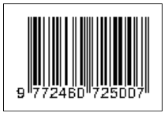Feasibility Study of Using Blockchain Technology for Criminal Records in Central Java
Puspa Ira Dewi Candra Wulan(1*), Rofiq Fauzi(2), Danis Putra Perdana(3), Muhamad Eko Alfianto(4), Clarissa Monique Maharani(5), Yudha Satria Abdi Susila(6)
(1) Politeknik Bhakti Semesta
(2) Politeknik Bhakti Semesta
(3) Politeknik Bhakti Semesta
(4) Politeknik Bhakti Semesta
(5) Rekayasa Keamanan SIber
(6) Politeknik Bhakti Semesta
(*) Corresponding Author
Abstract
Keywords
Full Text:
PDFReferences
R. I. Afriani, N. Handayani, T. Apriani, M. Husni, and U. Bina Bangsa, “Volume 4 Nomor 1 Tahun 2023”, doi: 10.46306/rev.v4i1.
P. Kedudukan Dan Kewenangan Kepolisian Perbandingan Kedudukan Dan Kewenangan Kepolisian, F. Eden Surbakti, A. Abdilah, F. Eden, and P. Kedudukan Dan Kewenangan, “PERBANDINGAN KEDUDUKAN DAN KEWENANGAN KEPOLISIAN DALAM KONSTITUSI YANG PERNAH BERLAKU DI INDONESIA,” J. Huk. Pembang., vol. 51, no. 1, p. 9, doi: 10.21143/jhp.vol51.no1.3012.
N. K. Sa’diyah and U. Enggarsasi, “Social Structure as the Root of Improving Criminality in the Era of Pandemic Covid-19,” Int. J. Criminol. Sociol., vol. 10, pp. 1202–1211, Jul. 2021, doi: 10.6000/1929-4409.2021.10.140.
M. A. Aldriano and M. A. Priyambodo, “CYBER CRIME DALAM SUDUT PANDANG HUKUM PIDANA,” J. Kewarganegaraan, vol. 6, no. 1, 2022.
S. Jaya Lesmana and I. Sofia Latif, “Law Enforcement in Efforts to Combat Cyber Crime in Indonesia: Building Future Digital Security.”
P. A. Sunarya, “Penerapan Sertifikat pada Sistem Keamanan menggunakan Teknologi Blockchain,” vol. 1, no. 1, pp. 58–67, 2022, [Online]. Available: https://journal.pandawan.id/mentari/article/view/139
T. K. Agrawal, J. Angelis, W. A. Khilji, R. Kalaiarasan, and M. Wiktorsson, “Demonstration of a blockchain-based framework using smart contracts for supply chain collaboration,” Int. J. Prod. Res., vol. 61, no. 5, pp. 1497–1516, 2023, doi: 10.1080/00207543.2022.2039413.
E. Saputra and D. Fitri, “SISTEM INFORMASI PENGAMANAN SKCK MENGGUNAKAN BARCODE PADA DIT INTELKAM POLDA RIAU,” J. Ilm. Rekayasa dan Manaj. Sist. Inf., vol. 5, no. 1, pp. 1–7, 2019.
E. Chandra Ramdhani, D. Indah Permatasari, J. Eka Sapitri, S. Informasi, and T. Informasi, “Ciptaan disebarluaskan di bawah Lisensi Creative Commons Atribusi 4.0 Internasional. SIPEKA (SISTEM INFORMASI PELAYANAN SKCK) PADA POLSESK KOTABARU KAB. KARAWANG,” J. Inf. Syst. Applied, Manag. Account. Res. ( Printed), vol. 5, no. 1, 2021, [Online]. Available: http://journal.stmikjayakarta.ac.id/index.php/jisamar,
P. P. Bandung, G. A. Rakhmat, and G. Alexis, “APLIKASI KAJAS SEBAGAI SISTEM INFORMASI PENGELOLA LAPORAN KRIMINALITAS BERBASIS WEB.”
Hendriyati Haryani, S. M. Wahid, A. Fitriani, and M. faris Ariq, “Analisa Peluang Penerapan Teknologi Blockchain dan Gamifikasi pada Pendidikan,” J. MENTARI Manajemen, Pendidik. dan Teknol. Inf., vol. 1, no. 2, pp. 163–174, Jan. 2023, doi: 10.34306/mentari.v1i2.250.
A. M. Mabruroh, F. Dewanta, and A. A. Wardana, “Implementasi Ethereum Blockchain dan Smart Contract Pada Jaringan Smart Energy Meter,” MULTINETICS, vol. 7, no. 1, pp. 82–91, Oct. 2021, doi: 10.32722/multinetics.v7i1.4122.
R. Balai, B. Pengembangan, S. Dan, P. Kominfo, K. Medan, and J. Tombak, “KAJIAN NETNOGRAFI TERHADAP KOMUNITAS CYBER DBC NETWORK ETNOGRAPHY STUDY ON COMMUNITY CYBER DBC NETWORK,” 2018.
Article Metrics
Refbacks
- There are currently no refbacks.
Copyright (c) 2024 IJCCS (Indonesian Journal of Computing and Cybernetics Systems)

This work is licensed under a Creative Commons Attribution-ShareAlike 4.0 International License.
View My Stats1








